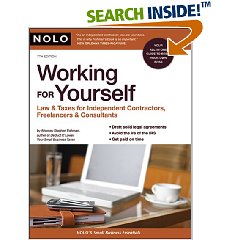 I don’t give tax advice–I’m not a tax pro nor do I claim to have any real answers on the actual filing of your taxes, but I can give you some advice on things that could get you out of a jam–at least temporarily. One of the worst things that happens to any freelancer before filing taxes is a change of address. You’re sure to lose SOMETHING you need when filing on April 15th, and you’ll never dig it out in time to meet your deadline. You’ll discover a box of missing receipts or other documentation on New Year’s eve next year when you’re searching for party hats.
I don’t give tax advice–I’m not a tax pro nor do I claim to have any real answers on the actual filing of your taxes, but I can give you some advice on things that could get you out of a jam–at least temporarily. One of the worst things that happens to any freelancer before filing taxes is a change of address. You’re sure to lose SOMETHING you need when filing on April 15th, and you’ll never dig it out in time to meet your deadline. You’ll discover a box of missing receipts or other documentation on New Year’s eve next year when you’re searching for party hats.
So what’s a poor freelancer to do when coming up short on those receipts you need to claim your deductions properly?
First thing I do is get in touch with my bank. Anything you’ve charged for business in the last year should show up on your statements unless you paid cash, and who pays cash for business expenses these days? Use the bank statements to prove you made the purchases, and file any required paperwork with the IRS for a missing receipt.
The trick in these cases is to show the IRS you want to follow the rules and take the deductions you’re entitled to. Submit deductions with no paperwork and you risk an audit–it just looks too fishy to claim a sum (especially a triple digit or higher one) with nothing to back it up.
I’ve touched on filing for an extension before, and if you need the extra time to get your paperwork in order, it could really shave a lot of worry off…an extension may be worth it, especially if you know where your receipts are but just have to get to them sooner or later. If you’ve moved cross-country and you are waiting for a shipment or a box that you mailed to yourself on the other end, you know exactly what I mean.
Ever open a box of receipts only to discover that many of them have faded over time? Your best bet is to try the bank again or your credit card company–but don’t delay. You may only have a limited amount of time to get copies of your statements without having to pay for them.

